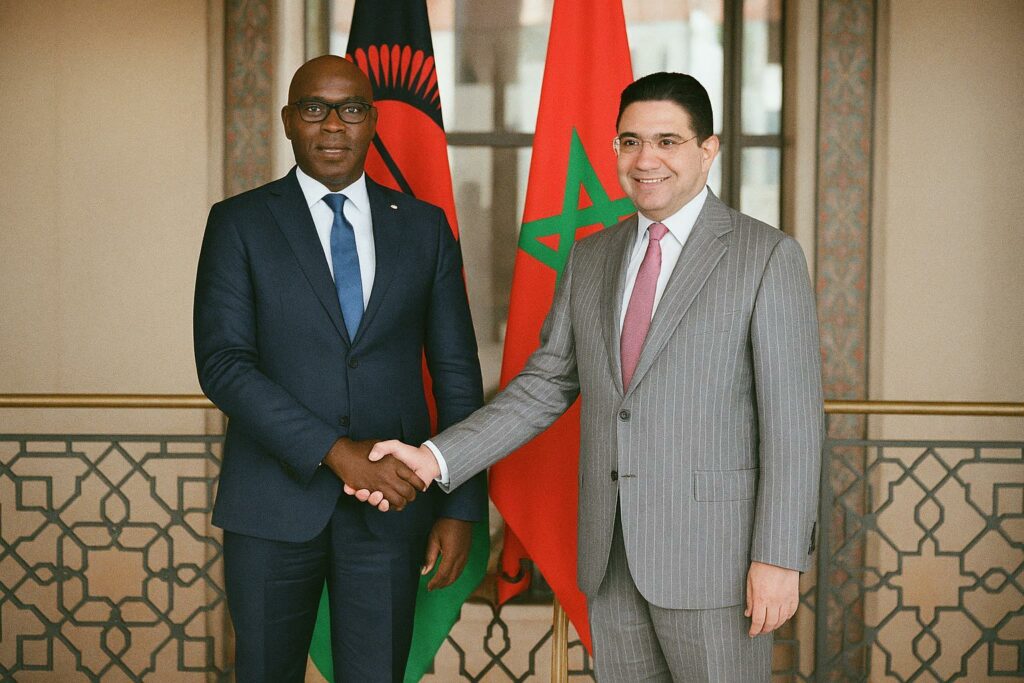A gesture wrapped in velvet diplomacy
When President Lazarus Chakwera dispatched former foreign minister Eisenhower Nduwa Mkaka to the Moroccan capital this week, the choreography was as telling as the communiqué. The special envoy carried a personal message to King Mohammed VI and emerged from Rabat’s foreign ministry studios to proclaim, once again, that “no solution can be considered outside the framework of Morocco’s territorial integrity.” Those words, echoed previously by Bahrain, the United Arab Emirates and Senegal, matter precisely because they collide with the African Union’s official posture of neutrality and the UN doctrine of self-determination. In the choreography of international relations, messages transmitted in person to monarchs serve as both diplomatic theatre and substantive signal, reminding onlookers that Lilongwe is not drifting but deliberately mooring itself to Rabat’s narrative.
From Bingu to Chakwera: the quiet evolution of Malawi’s Sahara stance
Malawi’s journey on the Saharan question has zig-zagged with changing administrations. Under President Bingu wa Mutharika, Lilongwe flirted with recognition of the Sahrawi Arab Democratic Republic, aligning with an Organisation of African Unity consensus that peaked in the 1980s. Yet the country never opened an embassy in Tindouf and, by 2017, the cabinet of Peter Mutharika had begun an incremental pivot. Diplomatic insiders recall that commercial overtures from Morocco’s phosphates giant OCP and offers of agricultural scholarships softened resistance in Lilongwe (Institute for Security Studies, 2020). Chakwera’s consolidation of the new line culminated in July 2021 with the inauguration of a consulate in Laâyoune—a coastal city claimed by Rabat yet still listed by the UN as a “Non-Self-Governing Territory.” The recalibration illustrates how small states leverage contested dossiers to extract infrastructure partnerships and budgetary support.
Consulates as cartographic tools in North Africa
Morocco has pursued a deliberate policy of encouraging allied states to open consular representations south of the 27th parallel. Twenty-eight countries, from Côte d’Ivoire to Djibouti, now maintain diplomatic plaques in Laâyoune or Dakhla, transforming modest offices into geopolitical pins on the map. For Rabat, each ribbon-cutting constitutes de facto recognition that the Sahara forms part of the kingdom, an argument it brandishes in New York when UN Security Council resolutions such as 2602 talk of a “durable and mutually acceptable” settlement. Critics, including the Polisario Front’s emissary at the AU, insist the practice violates the spirit of neutrality embedded in the organisation’s Constitutive Act. Yet, in the absence of an enforcement mechanism, symbolism accrues value; the flags fluttering in Laâyoune become incremental facts on the ground.
African Union dynamics and the risk of intra-continental fracture
Malawi’s overt endorsement of Moroccan sovereignty places it squarely within the Casablanca–Rabat axis that is urging a re-examination of AU Resolution 635, which admitted the Sahrawi republic in 1984. Although heavyweight economies such as Nigeria and South Africa continue to champion Sahrawi self-determination, a growing bloc of smaller states fears that standing against Rabat may imperil bilateral investment. During the AU Executive Council in Addis Ababa last February, delegates quietly debated whether the union’s policy of “positive neutrality” is sustainable, given that member states are openly funding rival diplomatic footprints. A senior AU legal adviser confided that the regional body risks “sleepwalking into an institutional schizophrenia” unless a common denominator can be articulated.
Geostrategic dividends and hidden costs for Lilongwe
Support for Morocco has already yielded tangible gains. OCP has pledged fertiliser supplies at concessionary rates, and the Moroccan Agency for International Cooperation has expanded scholarships for Malawian engineers. In an economy where tobacco still accounts for 60 percent of foreign earnings, such diversification is strategically welcome. At the same time, Lilongwe must navigate potential friction with Algeria, a leading financier of the Southern African Development Community’s renewable-energy projects. Algerian diplomats, speaking on background in Pretoria, caution that states cannot “eat from both plates indefinitely.” There is also the reputational risk of aligning too closely with a position that may stall at the UN, particularly if Washington, which recognised Moroccan sovereignty under the Trump administration, recalibrates once more. Secretary Blinken’s 2021 call for a Special Envoy for Western Sahara suggested at least a partial re-opening of deliberations.
Future horizons amid an unresolved conflict
For now, Malawi’s declaration is unlikely to alter the military balance along the berm that divides Moroccan-controlled territory from Polisario-held enclaves. Yet every additional endorsement chips at the perception that Africa speaks with one voice on the issue. If the UN-mediated process under Personal Envoy Staffan de Mistura gains momentum in 2024, Rabat will be able to brandish Malawian and other African consulates as evidence that its autonomy proposal enjoys continental legitimacy. Conversely, should talks falter, Lilongwe may find itself scrutinised by a new generation of African parliamentarians for whom decolonisation remains unfinished business. The calculus, as ever for small landlocked states, is to maximise present dividends while keeping diplomatic doors ajar. In reaffirming its stance this week, Malawi has made a wager that Morocco’s star—economic, diplomatic and soft-power—will continue to rise faster than the cost of alienating the opposing camp.

